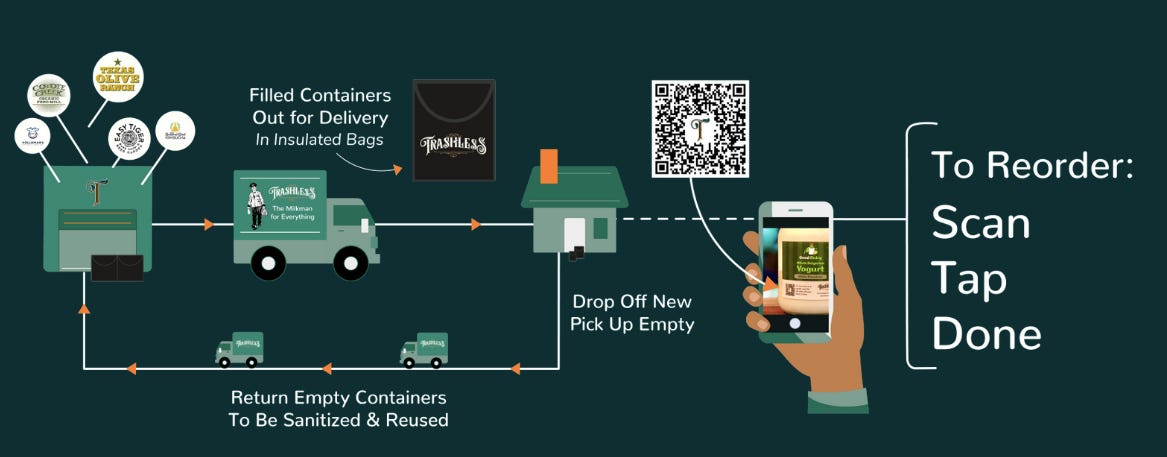In 1983, CavinKare introduced this concept
And that changed the world of FMCG
I am talking about sachets.
If you’ve lived or been to a developing nation in Asia or Africa, you would’ve seen sachets in mom-and-pop stores.
In 1983, CavinKare introduced this concept with its Chik shampoo in India.
That step revolutionized the FMCG sector in developing nations.
Companies started selling their skincare and haircare products in these sachets.
Sachets allowed companies to sell their products to low-income groups- in a manner that’s affordable for them.
Customers get to use an expensive product at a low cost and are more willing to experiment with it.
Some of them may even consider upgrading to a bigger size product.
While this innovation has worked well for the companies and consumers, the planet is not happy about it.
In today’s edition, read about the problems they’ve created and how an Indonesian startup is tackling that.
Also, read how 2 other startups are promoting reusable packaging in different industries. ⬇️
The problem…Lower-income communities, especially in Asian countries, buy their daily essentials in the form of sachets. Shampoos, creams, detergents- they are usually purchased in these single-use sachets and they are thrown away after use. They ultimately end up in waterways and oceans, adding to the plastic problem. The problem is prevalent in Indonesia, which is also the second-largest ocean plastic polluter in the world.
Wherever and whenever…Siklus, which means ‘cycle’ in Bahasa Indonesia, is providing an alternative to these single-use sachets in the country. Launched in 2019, the startup provides refills of everyday cleaning and sanitary products to homes and businesses in Jakarta, Indonesia’s capital. Siklus has installed the refill vending machines on bikes that arrive outside the customer’s home in a few clicks. Here’s how it works-
Through the app, consumers can order cleaning and sanitization products.
Siklus sends the mobile bikes to the customer’s place.
Customers can fill up the products(as much as they need) in reusable containers.
This is one of the most engaging explainer videos that I have seen(English CC available)⬇️
Another problem…Customers are used to the portions of the sachets and they believe that if they use the containers, they would end up using more. So Siklus is working on better bottle designs so that one pump is equivalent to half a sachet. Siklus helps customers save 15-30% of the cost, which is essentially the packaging cost of the product.
Bad for us and the planet…Most of us use a deodorant or an antiperspirant. Or probably both. Conventional deodorants or antiperspirants contain chemicals that impact our health. Diethanolamine and Parabens are linked to cancer, Triclosan is an endocrine disruptor. If you ever see Fragrance as an ingredient- just stay away. And on top of that, these deodorant bottles eventually end up in landfills or oceans.
Don’t throw that…UK-based Wild is solving these problems by creating a deodorant for life. They have designed an applicator made of aluminum that can be refilled with bamboo pulp deodorant refills. So every time you need a new deodorant, you just need to order the refills. The brand claims that with every refill, you prevent 30 grams of plastic from going to the landfill.
The aluminum applicator has to be purchased just once at the beginning.
The refills are made from natural fibre and are compostable- rot away to nothing.
You have an option to choose from 7 different scents.
Wondering how it works? Check the video⬇️
Also…Wild deodorants are powered by plants and do not use any of the cancer-causing, hormone-disrupting ingredients. The products are vegan and animal cruelty-free. Wild also claims to be carbon negative, thanks to their reforestation efforts, which happen everytime their product is purchased.
It’s not easy…Most of us want to do the right thing- buy from local brands, buy from brands that are environmentally friendly and avoid single-use plastic. But we are stuck in a system where we have to give up convenience to reach that stage. And it doesn't help seeing others around us going on with their lives without caring much about these issues.
How about now?… US-based grocery startup Trashless aims to modernize sustainability and make it easier for customers to switch to a lifestyle that’s better for the planet. They are replacing single-use packaging for grocery items with multi-use glass and metal containers. All this while making sure that the products are affordable and locally produced and the processes are convenient for the customers. Here’s how they do it-
They operate in Austin and work with local producers- promote the local economy and reduce the distance travelled by food.
They deliver smaller fresher quantities to the customer - reduce wastage and keep the produce fresh.
Customers don’t need to put in any deposits and the delivery is fast and free(or minimal)- convenient.
Not only this…No plastic in packaging means less amount of plastic ends up in the landfill or oceans, and also the harmful chemicals in the plastic are prevented from entering our food. Through its Community Support Program, Trashless is also committed to supporting people facing hardships like unemployment, disability or illness. The program allows families in need to receive groceries at little to no cost.
Here’s what I read this week-
World’s first passenger flight using 100% sustainable aviation fuel
Rising albatross divorces due to climate change
Top 21 Climate Change photos of 2021
If you liked this edition, please do share it. That would mean a lot😊
If you haven’t, you can subscribe here-
Thanks and see you next week😄










